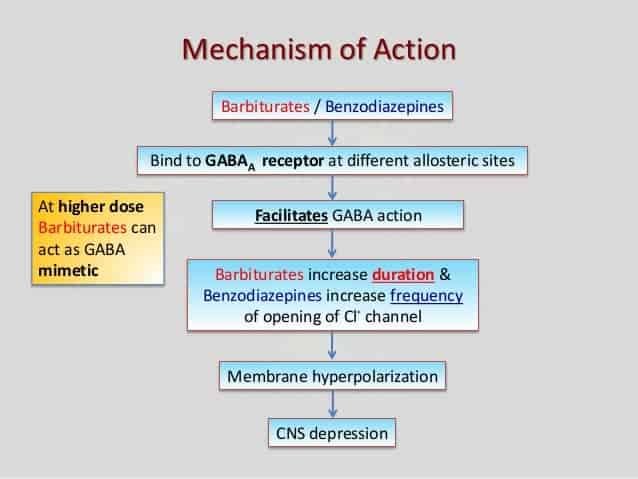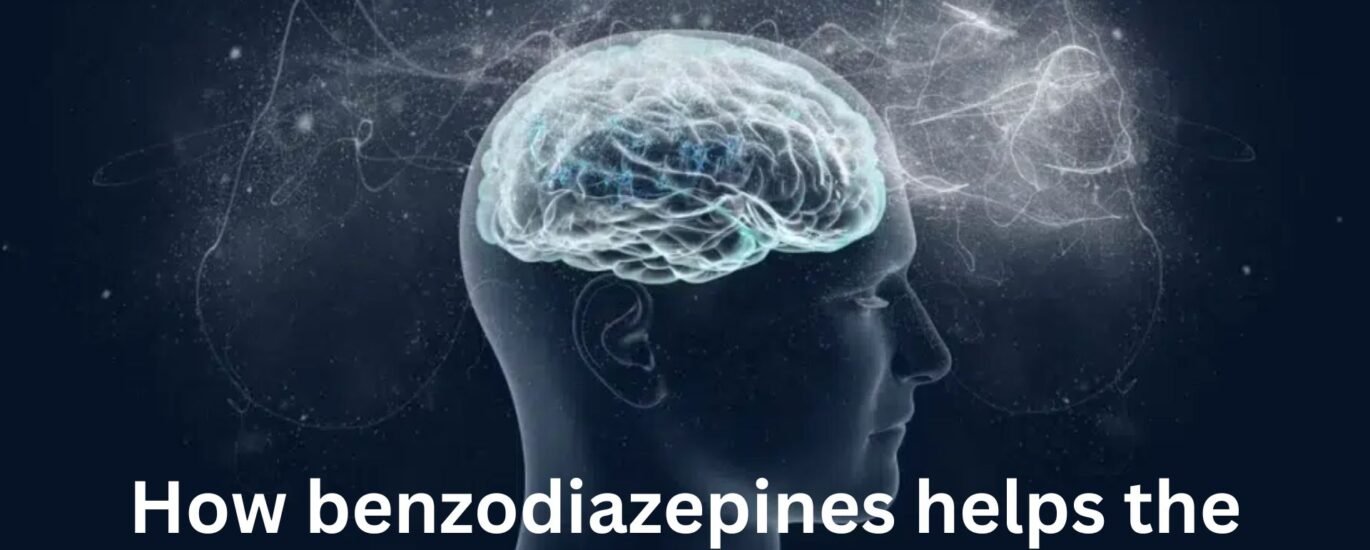How Benzodiazepines Soothe the Insomniac’s Mind: Here’s what you need to accomplish with the best 4 ways
Benzodiazepines help the insomniac’s brain by enhancing the effects of GABA, which reduces neural excitability and induces a state of relaxation conducive to sleep. By calming anxiety and inhibiting overactive brain areas, these medications provide valuable relief for people with insomnia, especially when the disorder is anxiety-driven or linked to heightened brain arousal. However, they should be used cautiously and under medical supervision, as their long-term use can lead to tolerance, dependence, and other side effects. Benzodiazepines are important in the treatment of insomnia, especially for those who have difficulty falling asleep or staying asleep because of increased anxiety, stress, or hyperactivity in the brain. To explain how benzodiazepines assist the insomniac’s brain, it is essential to examine their particular mechanism of action and the impact they have on the CNS.
At the heart of benzodiazepines’ action is their ability to enhance the effects of GABA, the brain’s primary inhibitory neurotransmitter. GABA (gamma-aminobutyric acid) functions to reduce neuronal excitability by binding to GABA-A receptors on neurons, which in turn opens ion channels that allow chloride ions to enter the cell. This influx of chloride ions makes the neuron more negatively charged, making it less likely to fire. In essence, GABA is a natural “brake” for the brain, calming overactivity that can cause anxiety, stress, and sleep disturbances.
Understanding Insomnia and the Brain’s Sleep-Wake Cycle

Insomnia is the most common sleep disorder. A person with insomnia has difficulty falling asleep, staying asleep, or getting quality, restorative sleep in other sleepers. The main characteristics of the symptom include a significantly long period before falling asleep, waking several times while at night, and waking up too early and not being able to fall back asleep. This leads to daytime fatigue, irritability, lack of focus, and mood disturbances with the person suffering from insomnia. There are two main types of insomnia: acute insomnia, short-term, often caused by stress, anxiety, or a short-term disruption in daily life; and chronic insomnia, which is the persistence of at least three nights a week for three months or longer and is often caused by underlying health conditions, medication side effects, or long-term stress. Common causes of insomnia are psychological factors like stress, anxiety, and depression; poor sleep habits; specific medical conditions like chronic pain or sleep apnea; hormonal changes; or medications that may interfere with sleep.
However, in individuals with insomnia, these two systems can become misaligned or dysfunctional. The circadian rhythm may become out of sync, causing the person to feel sleepy at the wrong times, such as during the day, while being unable to fall asleep at night. Additionally, anxiety, stress, or overactive thoughts can lead to a heightened state of alertness, preventing the brain from switching into a restful mode. When this occurs, the brain’s arousal systems, including the sympathetic nervous system, remain active, keeping the body in a state of fight-or-flight readiness, which impedes sleep initiation. As a result, individuals with insomnia experience a persistent cycle of sleeplessness, often leading to chronic sleep deprivation and cognitive, emotional, and physical impairment.
Benzodiazepines and Their Mechanism Action on the Brain

Benzodiazepines exert their action on the brain by enhancing GABA’s natural inhibitory effects, reducing neural excitability, and producing calming, sedative effects. By doing so, they help alleviate conditions like anxiety and insomnia, where overactive brain activity hinders relaxation and sleep. While they offer effective short-term relief, their potential for dependence and other side effects underscores the importance of using them judiciously and under medical supervision.
Primarily, benzodiazepines exert their therapeutic effects by altering the neurotransmitter systems of the brain, in this case GABA, which is the principal inhibitory neurotransmitter of the brain. The natural action of GABA is to inhibit neural activity by binding to specific receptors called GABA-A receptors. When GABA binds to the receptors, it opens chloride ion channels, and thus the neuron is more negatively charged and less likely to fire.
Enhancing GABA Activity
- GABA is the brain’s primary inhibitory neurotransmitter, meaning it helps calm or “slow down” nerve signals. Think of it like a brake for your brain, turning off excessive firing of neurons that might otherwise cause anxiety, stress, or overactivity.
- Benzodiazepines enhance GABA activity through the binding at specific sites located on the GABA-A receptor. When these benzodiazepines attach to the receptor, they boost the rate that the GABA molecule opens the ion channels in the neurons, permitting more chloride ions to enter the cell. The cell becomes hyperpolarized, and hence less likely to fire, bringing about a soothing, sedating effect on the brain.
Sleep Induction
- The increased GABAergic activity causes a reduction in neural excitability, thereby helping to quiet down the hyperactive areas of the brain. This is most beneficial in cases of insomnia related to increased anxiety or stress.
- The sedative nature of benzodiazepines makes a patient relaxed with tranquility to reduce sleep disruptions such as falling asleep in persons who are already insomniacs. Moreover, it relieves those sleeping problems associated with anxiety because, on reducing anxiousness, these chemicals minimize the racing thoughts and tension that causes inability to fall sleep.
Effect on Sleep Architecture
- While they work well in getting sleepers to bed easily, benzodiazepines often compromise the quality of sleep because they can destabilize the normal sleep cycle, especially REM sleep, which is characterized by having dreams and improving cognitive functions. Thus, while benzodiazepines should get a person to sleep easily, rest may not be as effective as when one is left to his or her own slumber.
- In general, deep sleep (slow-wave sleep) may still occur, but the overall architecture of sleep is modified. This is why they are typically recommended for short-term use or in situations where immediate relief is necessary.
Why Benzodiazepines Are Effective for Insomnia
Benzodiazepines are effective for insomnia because they enhance the action of GABA, leading to CNS depression that reduces anxiety and brain excitability, allowing individuals to relax and fall asleep more easily. While they provide immediate relief for insomnia, they should be used judiciously and under medical supervision to avoid potential side effects, tolerance, and dependence. For chronic insomnia, a comprehensive approach that includes both pharmacological and non-pharmacological treatments is typically the most effective strategy. Benzodiazepines are often considered to be quite effective in the treatment of insomnia because they can affect brain chemistry in such a manner that people tend to relax and go to sleep easily. In most cases, insomnia is caused due to an overactive mind and/or stress or anxiety that makes it difficult to sleep or stay asleep. Benzodiazepines are specifically effective in controlling these conditions since they increase the action of GABA, which is a neurotransmitter that helps to suppress neural activity, therefore creating a soothing effect on the brain.
Rapid Onset of Action
Another reason benzodiazepines are so effective for insomnia is the rapid onset. Within 30 minutes to an hour after dosing, these medications can have a sedative effect and therefore are an ideal choice for individuals who have trouble falling asleep within a short time frame or in severe, acute insomnia.
Control of Anxiety and Sleep Disturbance
Benzodiazepines are usually prescribed when anxiety aggravates insomnia. Stress and worry usually are the cause for failing to sleep because of a still-acting brain. By fending off the hyperactive brain, benzodiazepines reduce the physical and psychological symptoms of anxiety and thus enable sleeping well.
Immediate Relief
Benzodiazepines are useful for acute insomnia, but they are usually not recommended as a long-term solution due to the dangers of dependency and tolerance, meaning the need for increased dosages to maintain the same level of effectiveness. For chronic insomnia, health professionals typically suggest behavioral therapies, such as CBT-I, for a more lasting cure, but benzodiazepines may be useful in the short term as a rescue medication.
A Deep Dive into Their Mechanism of Action
Benzodiazepines are a class of drugs primarily used to treat anxiety, insomnia, seizures, and other conditions involving excessive neural activity. Their efficacy in the treatment of insomnia and other disorders is due to their ability to modulate the central nervous system (CNS), particularly by interacting with the brain’s neurotransmitter systems. To understand how benzodiazepines help in alleviating insomnia, it is very important to take a closer look at their mechanism of action, and in this respect, how they influence GABA, the primary inhibitory neurotransmitter of the brain.
Benzodiazepine’s central action involves enhancing the action of GABA. GABA naturally works by inhibiting or reducing the activity of neurons in the brain. It binds to GABA-A receptors, which are placed on the surface of neurons, to open chloride ion channels. Influx of chloride ions makes the inside of the neuron more negatively charged, placing it in a hyperpolarized state, which reduces the likelihood that the neuron will fire, thereby calming neural activity and reducing feelings of anxiety, stress, and agitation—key factors contributing to insomnia.
In summing up the review, efficacy for benzodiazepine is based on GABA-related function, mainly enhanced action via increase in neuron inhibitory impulses within the CNS. Benzodiazepines help decrease anxiety, relax the body, and promote sleep by enhancing the natural calming effect of GABA. Nevertheless, their liability for tolerance and dependence, along with their propensity to disrupt sleep, makes it advisable to use them judiciously and for as short a time as possible. In the management of long-term insomnia, this usually means adding behavioral therapies or lifestyle modifications.

Conclusion
In conclusion, benzodiazepines represent a highly effective, short-term solution for insomnia sufferers, especially when the condition is associated with anxiety, stress, or excessive brain activity. They enhance the action of GABA, the primary inhibitory neurotransmitter in the brain, leading to relaxation, the reduction of nerve cell overexcitability, and easier sleep induction. Although they immediately help and in the short run can significantly enhance the quality of sleep, it should be considered that benzodiazepines are not to be used for treatment of chronic insomnia, as it is not related to the cure of the main problem. This means that using these drugs in the long term leads to development of tolerance, dependence, or memory impairment, drowsiness, etc. For these reasons, benzodiazepines are only recommended for a short-term usage or as an adjunctive measure in a greater treatment plan of cognitive behavioral therapy or lifestyle modification. Ultimately, an understanding of how benzodiazepines act helps explain how they work in calming the brain but also places a strong focus on the pursuit of long-term solutions for addressing insomnia in healthy and sustainable ways. It is always crucial for individuals to work closely with healthcare professionals and weigh the risks and benefits for the management of their insomnia to be done effectively and safely.






